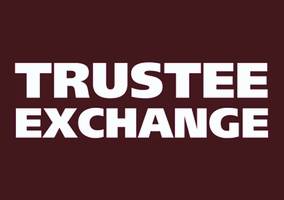To book onto this year's event, please click here
Find solutions to shared charity governance issues at this essential one-day conference for chairs, chief executives and trustees.
Returning for its tenth successful year, in 2017, Trustee Exchange will take place at the Royal Garden Hotel on 27 April. The ethos of this essential one-day conference remains the same. Trustee Exchange has always been produced by trustees, for the benefit of trustees.
Programme
27 April 2017
-
9.00AM - 9.25AMRegistration, refreshments & networkingRegistration, refreshments & networking
-
9.25AM - 9.35AMChair's welcomeTania Mason, editor, Governance & Leadership
-
9.35AM - 10.15AMOpening keynote: The role of the board in achieving transformational growth
Challenging times for charities call for exceptional leadership and a mandate of support, scrutiny and strategy from the board to increase transparency, impact and growth. Reflecting on her extensive experience of over thirty years' leadership roles in the charity sector, Julia Unwin will discuss the evolving role of good governance in today's world.
Julia Unwin CBE, chief executive, Joseph Rowntree Foundation and chair, Inquiry into the Future of Civil Society
-
10.15AM - 11.00AM1A. Restoring donor trust - the role of the board to balance risk and innovation in fundraising
Since the media furore of 2015 there has been a renewed emphasis on the need for trustees to take full responsibility for their organisation's fundraising practices. But is there a risk that increased scrutiny in a difficult funding climate could result in boards suppressing innovative fundraising ideas which are crucial as a tool for raising valuable unrestricted funds? How can boards achieve the perfect balance between managing risk and championing creativity and innovation in fundraising?
Michael Winehouse, partnership development manager, Children’s Society and trustee, Cystic Fibrosis Trust
-
10.15AM - 11.00AM1B. Parkinson's UK case study: navigating risk and opportunity
Effective governance relies heavily on robust scrutiny of the potential risks facing an organisation and ensuring that the controls to mitigate them are in place. However it is broadly acknowledged that overly risk-averse organisations struggle to maintain a competitive advantage. Using Parkinson's UK as an example, this session will explore the process and potential benefits of reviewing your risk-management arrangements to develop awareness and strengthen the risk appetite of both the board and the senior leadership team.
Joe Nickel, head of planning, performance & change, and David Prince, chair, audit committee, Parkinson's UK -
10.15AM - 11.00AM1C. Financial literacy for trustees
Trustees have ultimate responsibility for the management and performance of their charity’s finances, and while it can be tempting to leave it all to the treasurer, the whole board should be engaging with financial issues. This session will impart practical tips for interpreting the accounts, keeping abreast of changing regulation and embedding good financial governance throughout the organisation.
Kate Sayer, partner, Sayer Vincent -
10.15AM - 11.00AM1D. How to beat boredom in the boardroom
As guardians of your charity's mission and vision, it is essential you hold efficient, constructive meetings to offer strategic leadership and governance. This interactive session will consider what factors can cause boredom in the boardroom, and explore some practical strategies for holding highly effective meetings. What steps can both the chair and trustees take to ensure time spent face-to-face is as productive as possible?
John Williams, vice chair, Association of Chairs -
11.00AM - 11.30AMNetworking and refreshment breakNetworking and refreshment break
-
11.30AM - 12.10PM2A. Navigating the new reality: building boards for a digital age
Staying ahead of the curve in a digital world is not just a skills challenge for charities, it is now a governance issue. Organisational and digital strategy are merging into one and boards must adapt to new trends and more agile ways of working or run the risk of becoming ineffectual. Some experts advocate recruiting trustees with specific skills in digital, a strategy which has been adopted by Reach Volunteering. This session will explore some of the challenges facing boards today and suggest ways of increasing the digital capacity of your board.
Janet Thorne, chief executive and Dominic Tinley, trustee Reach Volunteering -
11.30AM - 12.10PM2B. Data governance: a trustees' guideRecent research by NCVO found that two-thirds of the public do not trust charities to use their data properly; with the impact of 2015’s media fallout still being felt today, this study highlights the need for charities to adopt a rigorous approach to data governance. This session will address cyber-security threats, how to instil a culture of transparent and secure data management, guidance on legal requirements, and the importance of taking a fresh look at your data.
Data specialist tbc -
11.30AM - 12.10PM2C. Brexit Britain: economic outlook and market update
Attend this session for an update on the economic impact of the UK's vote to leave the EU, with particular emphasis on the implications for the charity sector. By explaining the current state of play in the UK economy and possible influencing factors Kate Rogers will focus on the key investment opportunities and challenges for trustees in the year ahead.
Kate Rogers, head of policy, Cazenove Charities.
-
11.30AM - 12.10PM2D. Addaction case study – Finding a shared vision post-merger
After merging with KCA in 2015, Addaction instantly grew from a £55m to an £75m organisation with a broader reach and increasingly complex processes and governance requirements. As a result, the charity underwent a major executive and directorate change, assessing the necessary requirements and board composition to strengthen and develop the organisation into the future. This session will reflect on the process of rebuilding and diversifying the board of trustees, including recruiting new trustees and the steps taken to maintain morale and deliver a unified and effective board.
Guy Pink, executive director of HR and Jane Winehouse, trustee, Addaction
-
12.10PM - 1.00PM3A. Dealing with disaster: what to do and when to do it
In today's interconnected digital world of 24-hour news and advanced mobile technology, where there is an insatiable appetite to share our lives and everything in it, bad news can become really bad news, fast. Successful crisis management in the modern era requires the ability to instantly build trust, ensure an open & transparent dialogue and an unparallelled need for speed. Jack Lundie will address the fundamental aspects of a crisis communication strategy and where to exploit an opportunity for positive PR.
Jack Lundie, director of communications, Oxfam GB -
12.10PM - 1.00PM3B. All eyes on civil society: is it time for a governance review?
Evidence indicates that the past year has seen a rapid increase in the demand for governance reviews across the charity sector. At a time where all eyes are on our sector, a governance review can be an effective way of ensuring your charity is fit for the future. But how can you assess whether or not it's the right time for your organisation? This session will focus on when to consider a governance review, the practicalities of what is involved, and the potential benefits.
Louise Thomson, head of policy (not-for-profit), ICSA: The Governance Institute -
12.10PM - 1.00PM3C. Engaging with the Charity Commission in a digital age
As the Charity Commission moves its resources online and pushes for digital engagement is your organisation making the most of the available advice? In this session Sarah Atkinson will describe some of the ways that your organisation could improve compliance as well as saving time and money and benefit in other ways by engaging with its new online resources.
Neal Green, Senior Policy Advisor and Amanda McMahon, Digital Content Manager, Charity Commission
-
12.10PM - 1.00PM3D. Panel discussion: Diversifying the board for future-focused governance
A lack of visible (age, gender, race, disability etc.) and neuro-diversity (experience, background, skills etc.) is a pressing issue for the UK charity sector. Our panel will discuss why building diverse charity boards matters more than ever, what's holding the sector back, and how to ensure inclusivity is an inherent value throughout your organisation.
Chair - Diana Garnham, consultant and director, RDB Insight
Panellists: Tesse Akpeki, governance specialist, Peter Swabey, director, ICSA and Michael Winehouse, trustee, Cystic Fibrosis Trust
-
1.00PM - 2.00PMLunch and networking breakLunch and networking break
-
2.00PM - 2.45PM4A. The shifting sands of fundraising - a regulatory update
In an ever-changing regulatory environment where boards are legally responsible for their organisation's fundraising practices it is crucial that trustees understand what compliance looks like and how to champion best practice. Trustees wanting a more thorough understanding of the current challenges facing their organisation's fundraisers should attend this critical update on all things fundraising.
Stephen Dunmore, chief executive, Fundraising Regulator
-
2.00PM - 2.45PM4B. Panel discussion: Building better hospice governanceIn the light of increased scrutiny from the media and regulators, good governance matters more than ever. One sub-sector taking this seriously is the hospice sector, whose umbrella body (Hospice UK) is championing governance reviews across its membership and as part of its Governance Support Programme, masterclasses for trustees and good practice guides. In this session the panel will reflect on their experiences of undertaking governance reviews and the things that have made the biggest impact on their organisations.
Chair -Antonia Bunnin, director of hospice support and development, Hospice UK
Panellists - Simon Caraffi, chief executive, St Peter's Hospice, Bristol, Martin Jervis, chair, Thames Hospice, and Angela Jordan, chief executive, Prospect Hospice, Swindon -
2.00PM - 2.45PM4C. Charity legal update
This session will give an update on current changes including the Charities (Protection and Social Investment) Act to help your charity plan and comply effectively. It will also look at some of the likely outcomes of the Law Commission's consultation on charity law, the changing regulatory emphasis of the Charity Commission and other legal and regulatory developments affecting the sector, including fundraising and campaigning.
Emma-Jane Dalley, partner and Andrew Wherrett, Senior Associate Veale Wasbrough Vizards
-
2.00PM - 2.45PM4D. Personality and performance - getting the most out of your board
Charities spend a lot of time and resources making sure they have the right skills around the board table, but personalities and behaviours are just as important. It has been suggested that one of the factors hindering Kids Company may have been the dominance of creative characters and the lack of personality diversity. Andrew Hind describes different trustee personality types and offers tips on how to ensure you have the right mix of people in order to get the most out of your board.
Andrew Hind, professor of charity governance and finance, Cass Business School -
2.45PM - 3.05PMNetworking and refreshment breakNetworking and refreshment break
-
3.05PM - 3.45PM5A. Case study: You've hit the headlines...what next?
A whistleblower from within your organisation has gone to the Daily Mail with allegations about your charity's fundraising practices, the story is on today's front page and Twitter is awash with various interpretations of the facts. As the board of trustees how do you coordinate a united response to influence public perception and limit reputational damage?
Facilitated by Ron Finlay, principal, Ron Finlay Communications and a Charity Commission representative -
3.05PM - 3.45PM5B. Case study: Dealing with disunity
The board of this charity is becoming increasingly factionalised, its members split between the elected and the co-opted. Deep-seated disagreements between trustees are disrupting board meetings and stalling the organisation's development. A new chief executive has recently been appointed who has been given a remit for change, but is being hampered by the board's inability to come together to govern effectively. What's the best way forward?
Facilitated by Dorothy Dalton, governance specialist and a Charity Commission representative -
3.05PM - 3.45PM5C. Case study: How far is too far?
In this charity, the senior leadership team have been complaining that some of the trustees are becoming too involved in operational matters. The charity has recently appointed a new chief executive who, after a rocky start, has laid out a clear strategy and is now asking the board to back it. But the chair, who was a senior charity professional in his own career, has asked to rewrite it. How can the board harmoniously determine the best course of action?
Facilitated by David Ainsworth, Civil Society Media and a Charity Commission representative -
3.05PM - 3.45PM5D. Case study: Managing underperforming executives
This charity's chief executive has been in place for almost ten years, and has been accused of bullying staff. Two of the SMT have recently resigned, and disharmony and conflict is stifling productivity and affecting staff morale. How should the board of trustees deal with this to ensure the best outcome for the organisation?
Faciliated by Beryl Hobson, governance specialist and a Charity Commission representative
-
3.45PM - 4.30PMStronger charities for a strong society: Conclusions from the House of Lords report into the evolving role of charity governance
To close the day, Lord Lupton will discuss the conclusions the committee came to with regards to the House of Lords report on charities, with emphasis on board culture and the future direction of charity governance.
Lord Lupton is a member of the House of Lords Select Committee on Charities
-
4.30PM - 4.45PMChair's closing remarksDavid Ainsworth, group online editor, Civil Society Media
-
4.45PM - 5.45PMNetworking drinks receptionNetworking drinks reception
Presentations
Please note the panel discussions do not have presentations
10.15 Sessions
1A. Restoring donor trust - the role of the board to balance risk and innovation in fundraising
1B - Parkinson's UK case study navigating risk and opportunity
1C - Financial literacy for trustees.pdf
1D-How to beat boredom in the boardroom
11.30 sessions
2A- Navigating the new reality- building boards for a digital age
2B. Data governance: a trustees' guide
2C. Brexit Britain: economic outlook and market update
2D-Addaction Case Study-Finding a shared vision post-merger
12.15 sessions
3A. Dealing with disaster: what to do and when to do it
3B - All eyes on civil society is it time for a governance review
3C- Engaging with the Charity Commission in a digital age
3D. Panel discussion: Diversifying the board for future-focused governance
14.00 sessions
4A. The shifting sands of fundraising- a regulatory update
4B. Panel discussion: Building better hospice governance
4C-Charity Legal Update
4D-Personality and performance- getting the most out of your board
Testimonials
A good breadth of topics and gravitas of speakers
Useful information, excellent quality speakers. A 'must' for any trustee to attend
Another good conference well worth attending. Informative, educational, well-balanced and appropriate
The topics were current and interesting and the level of advice and discussion was excellent
Excellent speakers with current and professional expertise, and a great acknowledgement of modern governance challenges
Stimulating, relevant presentations from experienced communicators. A wonderful opportunity for networking and learning in a one-stop shop
Excellent event for an overall review of charity practices. Motivating and encouraging presentations to take back to the operations of the charity
Prices
| Early-bird (booking made by 17 March) |
Bookings after 17 March | |
| Small charity rate (<250k income) | 199 | 199 |
| Charity delegate | 249 | 299 |
| Charity extra place(s) | 149 | 199 |
| Charity team ticket (up to four places) | 599 | 749 |
All prices excluding VAT
Venue
The Royal Garden Hotel
2-24 Kensington High St
Kensington
London
W8 4PT
Website: www.royalgardenhotel.co.uk
Terms and Conditions
Please note that speakers and topics were confirmed at the time of publishing, however, circumstances beyond the control of the organisers may necessitate substitutions, alterations or cancellations of the speakers and/or topics. As such Civil Society Media Ltd reserves the right to alter or modify the advertised speakers and/or topics if necessary. Any substitutions or alterations will be updated on our web page as soon as possible.
Substitution and cancellation policy: On receipt of your booking form, your place is confirmed. Delegate substitutions are allowed. Refunds on cancellations will only be issued (less a 15% administration charge) up to and including 14 days prior to the event. Refunds will not be issued after this date. Confirmation of cancellations MUST be in writing and sent or faxed to Civil Society Media at 15 Prescott Place, London, SW4 6BS 020 7819 1200 (fax: 020 7819 1210).
Personal details: This conference is produced by Civil Society Media Ltd. By registering to attend you are agreeing to be contacted with information relating to your delegate place and future events. Please e-mail [email protected] if you do not wish to be contacted about associated products from Civil Society Media. Please e-mail [email protected] if you do not wish to receive carefully screened, work-related emails from selected third parties.



















